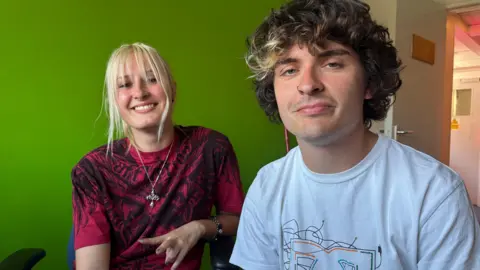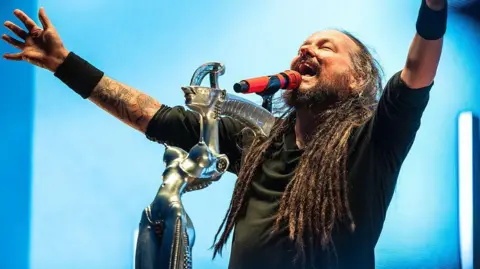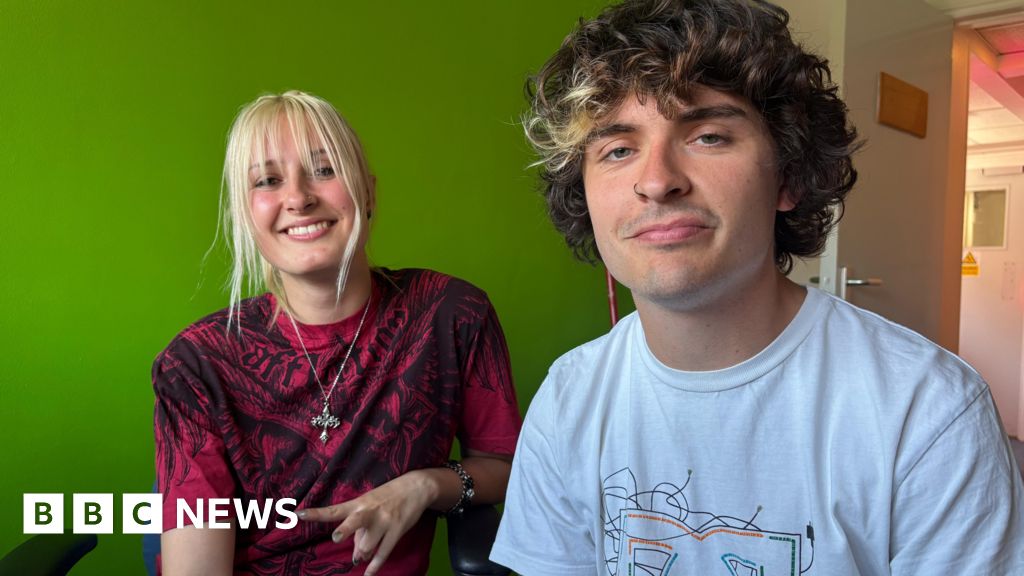Presenter, BBC Newsbeat
 BBC
BBCAsk pop-punk band South Arcade about the inspiration for their breakout hit, Supermodels, and get ready to go on a journey.
It starts at Shut Up and Drive by Rihanna, swerves into nu-metal band Korn’s cover of Word Up and detours towards Genesis, by French dance act Justice.
The final destination is Just Dance – the popular video game series where players rack up points by mimicking routines from chart-topping hits.
“You know when you go to a gaming arcade and there’s those dance mat machines?” asks singer Harmony.
“I was like: ‘I want to write a song that could be on that’.”
South Arcade are riding the wave of Y2K core – a growing interest in the 90s and early 2000s culture.
The four-piece’s sound – upbeat, rocky guitar music – would have been right at home on MTV, or the soundtrack of a 90s slasher movie.
“It has that weird, nostalgic feel to it,” says Harmony.
Both she and guitarist Harry were born at the start of the millennium, so admit their fondness for that time comes from older siblings and friends introducing them to the material.
Despite their lack of first-hand experience, the band have been described as “figureheads of a growing Y2K revival” by website MusicRadar.
“We can’t accept that we missed it,” says Harry, laughing. “So we have to bring it back single-handedly.”
 Getty Images
Getty ImagesSouth Arcade aren’t exactly alone, though. Some of the bands that inspired their sound have also had a surge in popularity.
At the recent Download festival, nu-metal veterans Korn headlined, and further down the bill fellow noughties heroes Alien Ant Farm pulled in crowds.
Linkin Park recently released their first new music since the death of original frontman Chester Bennington, and Limp Bizkit sold out arenas on a tour of the UK this year.
Harry says rap and dance music have dominated the mainstream landscape for the past 10 years, and believes more people his age are discovering what came before.
“Pre-2010 it was like a golden era of band music and guitar music,” says Harry.
“It was just full of great bands and then it just shifted, the pendulum swung.”
Parts of South Arcade’s rise have been far more 2025 than Y2K.
They started to gain traction via TikTok.
A spokesperson told Newsbeat that the Y2K hashtag has been used in four million posts on the app, with some of the most popular linked to noughties artists including Pitbull and Avril Lavigne.
Harmony says South Arcade’s videos began drawing an audience when they started uploading footage from their rehearsal sessions.
It’s something they’ve previously said was partly in response to accusations they were “industry plants” or “not a real band”.
They’re also not immune from the modern-day pressures facing musicians, with the cost-of-living crisis still biting.
A recent tour of America was “really expensive”, they admit, and keeping stage shows fresh involves getting creative with ideas “in the cheapest way possible”.
But the band say it’s been worth it and they’ve been seeing a mix of fans engaging with their music.
“It’s really great because we see a bunch of comments on YouTube from people that were in that era,” says Harmony, “and they can almost notice the references or pick it apart, but then there’s these much younger kids hearing that sort of stuff for the first time.
“It’s really cool to sort of bring everyone together on it.”
The appeal to fans who spent their teens listening to the likes of Korn is probably obvious. But what is the attraction of Y2K for people who were in nappies during the heyday?
“Everything’s going towards like, minimalism of phones,” says Harry.
“But in that era, your room was full of stuff, like not just a neat room, it was full of posters and action figures.
“Now people would just say they scroll on TikTok, but back in the day you’d have had gaming consoles and games and stuff like that, CD players and loads of things that are off your phone.
For Harmony, it’s a feeling of escapism.
“I get loads of nostalgia videos coming up for things from my childhood, you’ll see it and it’ll make you feel a certain sort of weird, twinkly way,” she says.
“And I think if we can capture that sort of feeling in music, when everyone’s bedrooms were their personality, it wasn’t just their Instagram feed.
“It was what the posters on their wall were, what characters they collected, things like that.”



